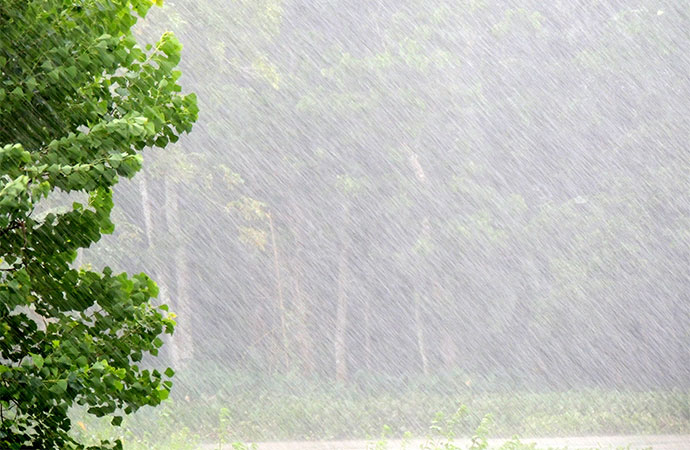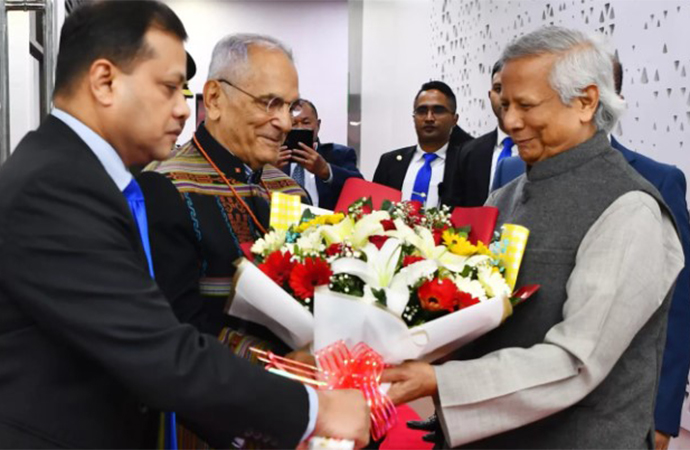Column

Counting of votes is underway in six states which would determine the result of the US presidential election. Photo: AP/UNB
After a harrowing Election Day, and the night of nail-biting anticipation following the US Presidential polls in the United States, it now appears that the Democratic candidate Joe Biden may be inching, albeit ever so slowly, towards victory. At writing he is just 6 counts shy of the magic number of 270 out of the 538-member electoral college that will give him the keys to the White House. It may not still be an easy process, however. There will be many a slip between the cup and the slip, and many a bump along what is most likely to be a tortuous path to the Executive Mansion. The incumbent, President Donald Trump has made it abundantly clear that he will not give in easily. He already has, in an unprecedented fashion, claimed victory with little to show for it in terms of evidence. Also, he has vowed to present his opponent as many legal hurdles to his goal. It is a sad picture that America has presented of itself to the world.
Part of the reason is inherent in the nature of the US Constitution. Its framers, anxious to prevent the recurrence of the tyranny of monarchy as they perceived as existing in the mother country, Britain, chose to write down the rules of governance, something uncommon at that time, in the eighteenth century. This entailed two major problems. First, It could not anticipate all future complex political issues and create rules to address them .Second, the document, as a result, was rendered largely inflexible, with an arduous amendment process, which was, again, necessary to reassure States joining the Federation. It might have had the ironic consequence of America's slower evolution in terms of the mores and norms of a truly inclusive democracy than was the case across the Atlantic. This reality was lost in the positive narrative about itself that America was able to project to the world, substantially aided by its geographical isolation from the turmoil of global politics.
Potential prospects in the new world attracted talents from all over. It provided America the material and intellectual wherewithal to become a major economic and military force. It engaged itself effectively in the two major Wars that the world experienced in the twentieth century. Thereafter, it helped create rules for the post-war global order, and remained its watchdog for several decades. As if to prove the historian Arnold Toynbee's thesis, America which had successfully responded and risen to those challenged, appeared to become overwhelmed by the excessive pressures that these posed. America and the Americans became exhausted. This was when Donald Trump inserted himself into the American ethos and cheer-led the many changes in the way America related to the world. Now it was with narrow perceived national self-interest in view, and not as a global leader.
But most of the changes were domestic. Immigration was altering demographic dynamics. Once white America was taking on more of a rainbow hue. The cauldron of varied cultures was severely straining the original Anglo-Saxon ethos. The way of life was changing. In commercial and trading intercourse rising powers like China, or even some old European powers were beginning to be seen as predators. There was burgeoning mutual suspicion between white and the colored communities like the blacks and Latinos. Not so deeply concerned with international reputation, once a sine qua non for world leadership now no longer a principal factor determining policy-action, the power elite led by Trump laser- focused on the narrower base support to retain political control. The Republican Party provided this elite political cover. The Society became divisive, and a corrosive ferment became palpable. This was the milieu in which Joe Biden and the Democrats mounted a challenge to Trump and his backers. This resulted in perhaps the most critical elections in that nation in this century.
As expected, it was not easy. We have not quite seen the end of it. The struggle could still assume bitter proportions. However, it does seem that Biden might have achieved an initial success in securing the required majority of electoral votes. But in the American system, there is no Queen as in Britain to appoint the head of government. The change is not effected by the courtly fashion of 'kissing (the Queen's) hands' as in the old mother country, but by a candidate conceding defeat to the rival. This calls for a modicum of decency, and can be problematic when that is wanting, as is the case now. Should a crisis present itself, which is not unlikely, then one can only hope that it is resolved without violence. But changes have occurred in the America that will live beyond Trump, because Trump was r not entirely their cause and not entirely their effect, but part cause and part effect.
As the we all prepare to relate to a post-Trump America, we will need to bear in mind that were it not for the disastrous impact of the Covid Pandemic on the country, and the manner in which the Federal Administration handled it, America would have re-elected Trump. Despite these policy errors, nearly half of America, perhaps the more powerful socio-political and economic segment of the US community, has voted for him. This point is further buttressed by the fact that notwithstanding the possible change of Presidency, the Senate will most likely remain Republican and the Supreme Court most certainly conservative. This will hobble the activities of the Presidency both in foreign and domestic affairs. Yes, America has spoken. But not in one unequivocal voice. In other words, some of these changes in American value system will continue to sustain into the future.
That is the new normal that the rest of the world will have to adapt itself to. There will be ripple effects of these changes in every nook and corner of the world. Domestic and global politics, economics and social relations will alter everywhere. Some for the better and some for the worse. We will have to accept the inevitability of the process, and thereafter, keep moving on.
The author is an Honorary Fellow of the Institute of South Asian Studies (ISAS) in Singapore and former Foreign Advisor (Foreign Minister) of Bangladesh and President of Cosmos Foundation Bangladesh. The views addressed in the article are his own. He can be reached at: isasiac @nus.edu.sg

























Leave a Comment
Recent Posts
The Forbidden City: A timeless ...
For foreigners exploring Beijing, the Forbidden City stands as a magni ...
2025: Moin, Mamun elected DCAB ...
AKM Moinuddin, Special Correspondent of United News of Bangladesh (UNB ...
Dhaka's ties with Delhi won’t get stuck on single is ..
Old state, new society
A foreign policy imperative for the year ahead
PS Commentators’ Predictions for 2025